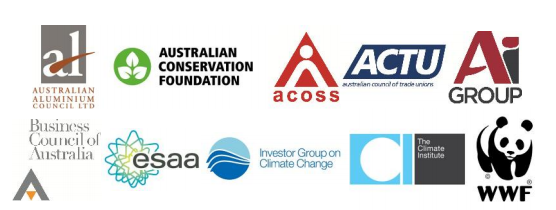The Abbott government has been delivered a gentle rebuke on climate policy by an unprecedented coalition of powerful interest groups calling for ambitious and stable action on global warming.
Although the coalition of groups – which is calling itself the Australian Climate Roundtable – does not mention the government’s Direct Action policy or Labor’s toppled carbon price it expressly endorses measures the Abbott government has so far ruled out.
The Climate Roundtable this morning outlined a series of ‘principles’ for climate policy including that emissions reductions efforts should be “internationally linked”, “capable of achieving deep reductions” and that greenhouse emissions should be reduced “across all sections of the economy”.
The group includes the Australian Business Chamber, Industry Group, Council of Social Services, Council of Trade Unions and a number of environmental and advocacy organisations, and represents the most powerful combined call for action to date.

The Federal government is due to unveil its post-2020 emissions reductions targets, and the policies it will use to achieve them, within two weeks as the international community ramps up for the December Paris climate talks.
The Climate Roundtable endorsed the Paris conference’s primary goal – to limit temperature increases to below two degrees above pre-industrial levels – which both major parties have also agreed to.
News of the new climate coalition comes just days after the Federal government dodged a push from the rural and regional committee at the Liberal party’s Federal Council to "examine the scientific evidence that underpins the man-made global warming theory”.
A cabal of climate sceptics from the rural and regional committee moved a motion at the conference which argued against signing any binding agreement at Paris to keep within the two degree guard rails but it was deflected to a policy committee for further consideration.
The Sydney Morning Herald reports that while Victorian Liberal President Michael Kroger suggested the motion be moved off to the policy committee, he maintained that the party was not trying to avoid debate but rather give more people a say on the issue.
It’s the kind of debate that the Australian Climate Roundtable appears to be trying to head off with its arguments that business, unions and the environment need stable policy settings that will actually do the job of affecting deep cuts to carbon emissions.
“This has been a tumultuous area of policy development on a major challenge for Australia that isn’t going away,” the organisations said in a joint statement.
“We thought it important to reset the objectives, principles and key priorities to make the next phase of policy development as civil and constructive as possible.”
The post-2020 emissions reductions targets the government will unveil later this month should provide a long-term strategy for tackling climate change but there is a high level of scepticism among analysts about the depth of the cuts.
The Federal Environment Minister Greg Hunt has eschewed the recommendations of the independent Climate Change Authority, which has suggested cuts of 30 per cent by 2025, as too onerous.
There is considerable doubt as to whether the government will even meet its current target of a five per cent cut to emissions by 2020, and it is unlikely that the Direct Action model of paying polluters to abate their carbon emissions could achieve deep cuts without exorbitant costs.
Unless it scraps Direct Action altogether it is likely the government will be forced to make changes to the ‘safeguard mechanism’ which is built into its policy framework, but essentially dormant as things stand.
The government had said the safeguard would prevent emissions intensive sectors of the economy from increasing their emissions without penalty after the carbon price was scrapped but in a move described by Independent Senator Nick Xenophon as one which effectively “neutered” Direct Action the mechanism was relaxed.
In order to make the deep cuts needed, and reduce emissions “across all sections of the economy”, the government will likely have to revisit the safeguard, which Labor could also use to move towards a price on carbon without repeating the policy uncertainty which largely inspired the Australian Climate Roundtable.
The roundtable noted that “delayed, unpredictable and piecemeal action will increase the costs and challenges of achieving the goals and maximising the opportunities” and that this would have costs not only for the environment but also for business, and particularly businesses like those represented by the Australian Aluminium Council.
In a statement the coalition of organisations said it had discussed its ‘principles’ with both major parties with a view towards setting out a “common ground on which more detailed policy can be built”.
“The Australian Climate Roundtable will continue to work together to ensure that climate policy meets our nation’s economic, environmental and social needs,” the group said.
“The foundations of climate policy need broad and durable support, and we all have a role in building it.”
Donate To New Matilda
New Matilda is a small, independent media outlet. We survive through reader contributions, and never losing a lawsuit. If you got something from this article, giving something back helps us to continue speaking truth to power. Every little bit counts.





